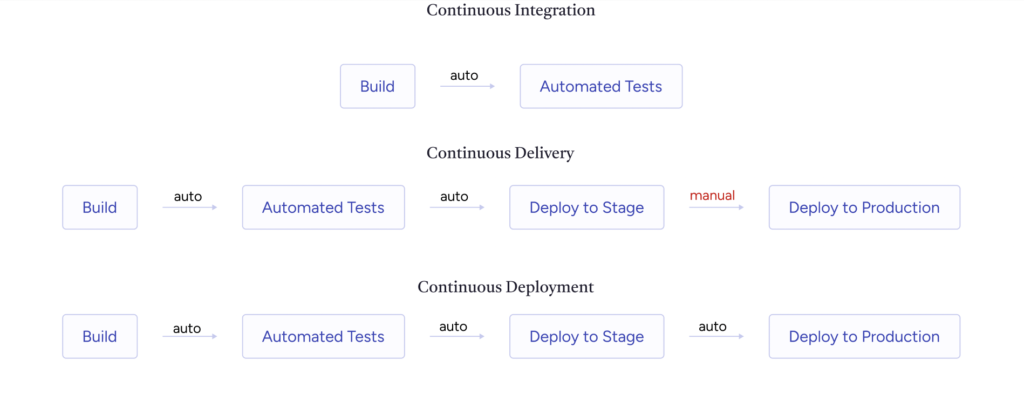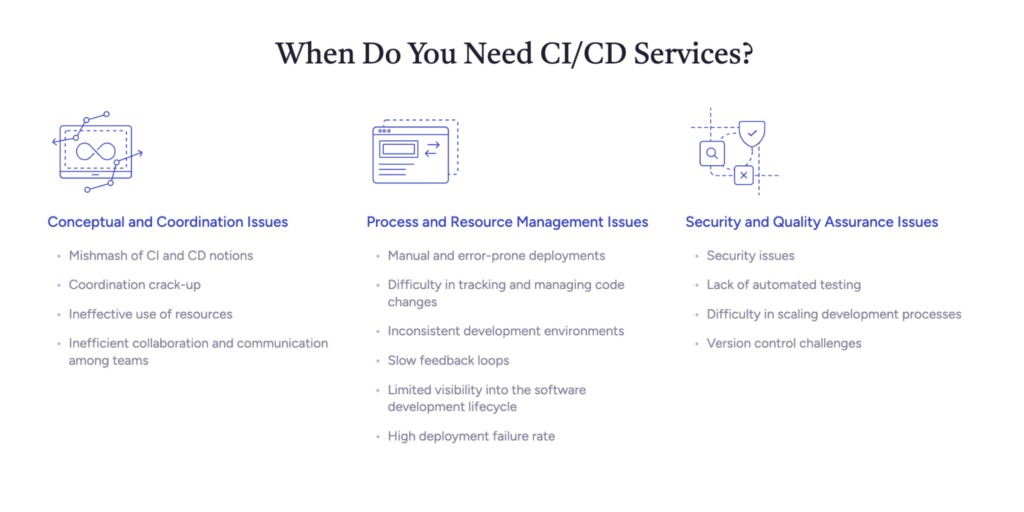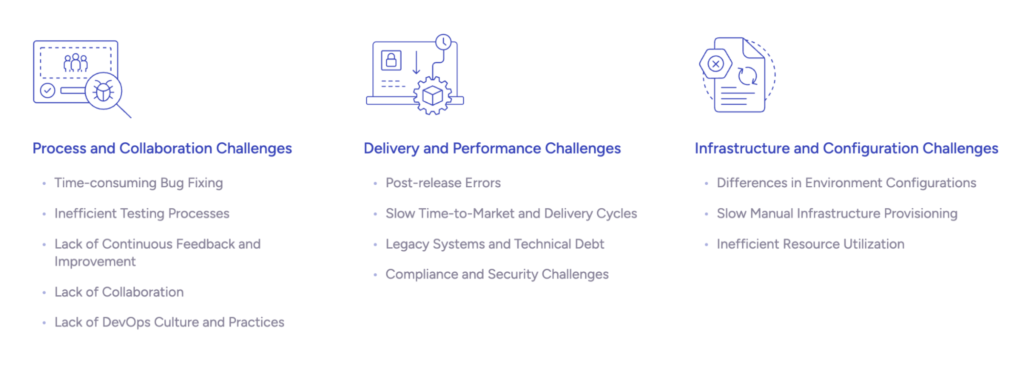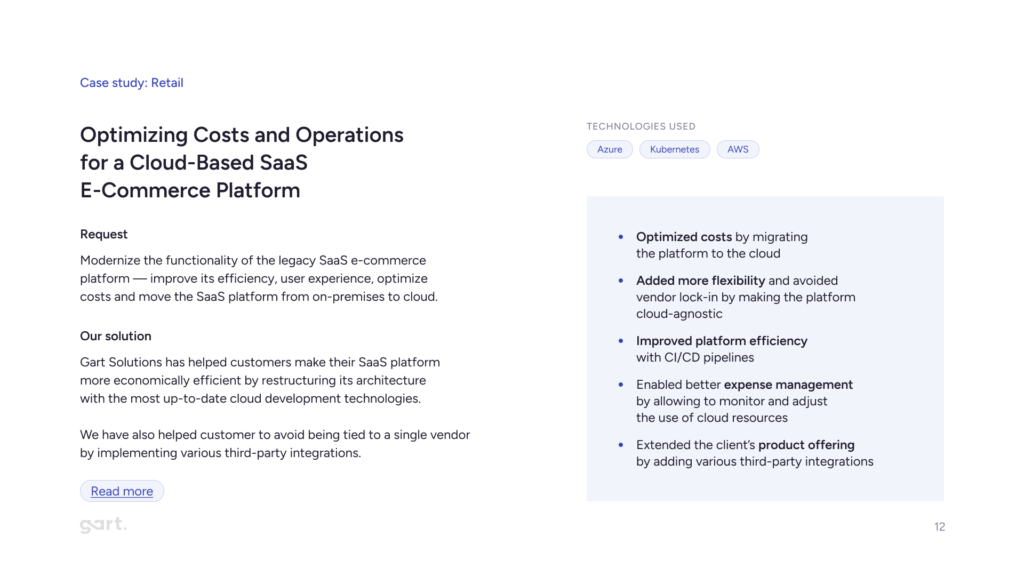SaaS is a thriving business model, providing entrepreneurs with quality code and scalability without financial risk. To fully tap into its potential, pairing it with DevOps is essential for efficient processes and infrastructure-ready solutions.
As a DevOps expert, we explain the technical and practical reasons for embracing DevOps and why DevOps outsourcing is a smart investment for the future.
What is DevOps?
DevOps, which stands for the convergence of development (Dev) and operations (Ops), represents an organizational approach that expedites application development and streamlines the maintenance of existing deployments. This paradigm not only unites development and operations (DevOps) but also encompasses QA (QAOps), security (DevSecOps), processes, and tools.
DevOps is fundamentally centered on “driving business transformation,” as articulated by one of its authorities, Robert Stroud. The implementation of DevOps practices through specialized software solutions constitutes a comprehensive strategy to boost productivity without compromising quality. This set of principles and methodologies aids companies in continuously delivering services or products, thereby reducing the software development lifecycle.
From a more abstract perspective, DevOps can be defined as an interdisciplinary community of practice with a focus on the construction, advancement, and operation of adaptable and agile systems at any scale. The emphasis on quality and service within DevOps draws inspiration from Lean and Agile methodologies.

Why SaaS Needs DevOps
SaaS and DevOps are like a dynamic duo, and there are several compelling reasons why SaaS absolutely needs DevOps. Here are three key reasons, along with a couple more:
Cloud Convenience
Scalability
SaaS applications often run in cloud environments. DevOps practices help SaaS companies take full advantage of the cloud’s scalability, enabling them to seamlessly handle varying workloads and efficiently allocate resources.
Infrastructure as Code (IaC) manages resources like servers and networks through machine-readable files. Integrating SaaS-managed DevOps brings expert skills without long-term high costs. IaC allows replicating and customizing infrastructure efficiently.
Resource Optimization
DevOps allows for the efficient management of cloud resources, ensuring that SaaS providers only pay for what they use and avoid unnecessary costs.
Global Availability
DevOps facilitates the deployment of SaaS applications across multiple regions and data centers, ensuring global availability and low latency for users worldwide.
Microservice architecture as the default for SaaS products
Modularity
Many SaaS platforms are built using microservices to break down complex applications into smaller, manageable components. DevOps supports the development, deployment, and scaling of these microservices independently, promoting agility and flexibility.

Although monolithic architecture remains the go-to choice for numerous enterprise-level software solutions, SaaS product development necessitates the adoption of a microservices architecture. The decoupling of services in microservices accelerates the growth of potentially expansive products with scalability goals, all while minimizing resource consumption and operational disruptions.
The transition from monolithic systems to microservices is an inexorable trend within the realm of SaaS. These products cater to a vast user base and simply cannot tolerate downtime. Hence, they demand seamless scalability, as well as the implementation of multi-region and multi-currency payment systems.
Continuous Integration/Continuous Deployment (CI/CD)
Microservices benefit greatly from CI/CD pipelines, which DevOps excels at. This allows SaaS companies to rapidly deploy updates to specific microservices without affecting the entire application.

Serverless Agility
Efficient Resource Management
Serverless computing abstracts infrastructure management, but it requires precise resource allocation. DevOps helps optimize serverless application functions, ensuring they run efficiently and cost-effectively.

Rapid Development
DevOps practices like automated testing and deployment are crucial for serverless applications, enabling quick iterations and reducing time-to-market for new features or enhancements.

Continuous Improvement
Feedback Loops
DevOps establishes feedback loops that collect user insights and operational data. SaaS companies can use this feedback to continuously improve their products, aligning development efforts with customer needs.
Innovation Acceleration
DevOps fosters a culture of innovation by encouraging experimentation, which is particularly important in the rapidly evolving SaaS landscape.
Security and Compliance
DevSecOps
DevOps extends to DevSecOps, where security is integrated into the development process. In the SaaS world, where data security and compliance are paramount, this approach ensures that security measures are consistently applied.

In essence, DevOps is the driving force behind the agility, scalability, and efficiency that SaaS companies require to succeed in a competitive and ever-changing industry. Whether in the cloud, with microservices, or leveraging serverless technology, DevOps is the linchpin for SaaS excellence.
Three Groups of Benefits of DevOps for a SaaS company
Let’s categorize the advantages of DevOps into three groups: Business Benefits, Cultural Benefits, and Technical Advantages. These categories help highlight the diverse benefits that DevOps brings to a SaaS company, encompassing not only technical improvements but also cultural and business advantages.

Business Benefits
Faster Time to Market
Accelerating development and deployment processes allows SaaS companies to launch new features and updates quickly, gaining a competitive edge.
Cost Efficiency
DevOps reduces operational expenses through automation, efficient resource utilization, and improved scalability, leading to cost savings.
Customer Satisfaction
Enhanced application stability and reliability, as well as faster issue resolution, contribute to higher customer satisfaction and retention rates.
Cultural Benefits
Improved Collaboration
DevOps fosters collaboration and knowledge sharing between teams, breaking down silos and promoting a culture of teamwork.
Continuous Learning and Improvement
DevOps encourages a culture of continuous improvement and learning, empowering teams to evolve and adapt.
Ownership and Accountability
DevOps practices instill a sense of ownership and accountability among team members, leading to a shared responsibility for product quality.
Technical Advantages
Enhanced Stability and Reliability
Automation and continuous monitoring improve the technical stability and reliability of SaaS applications.
Security Integration
DevOps integrates security practices (DevSecOps) into development processes, strengthening the security posture of SaaS platforms.
Scalability
DevOps enables seamless scalability to handle increased user loads and rapid growth without service disruptions.
Data-Driven Decision-Making
DevOps tools provide valuable data and insights for informed technical decisions and optimizations.
When is the Right Time to Enlist DevOps Expertise?
DevOps specialists are essential right from the project’s inception, offering valuable assistance in various aspects. They can tailor environments for development, testing, and deployment, as well as provide insights into efficient server architecture.
The tasks range from architectural redesign, DNS and database management, server migration, to problem-solving in case of system failures. DevOps plays a pivotal role throughout the project lifecycle, delivering value at various stages.
The scope of DevOps involvement in a project is vast, and here are scenarios illustrating when and how SaaS businesses can benefit:
At the Project’s Start
During Sprint Zero, DevOps specialists assist in defining the technology stack and architecture for future SaaS functionality. Experts set up distinct testing and production environments.
For Ongoing Projects
In existing projects, DevOps begins by assessing the system and its documentation. This includes tasks like configuring CI/CD, which involves identifying technologies, exploring databases, and reviewing network and server configurations. This phase is essential for identifying areas that require improvement and may take a few hours to a couple of days, depending on the situation.

DevOps engineers automate infrastructure management using Infrastructure as Code (IaC), streamlining the development process for SaaS companies.
DevOps consulting extends to optimizing server performance, providing insights into options, benchmarks, costs, and risks.

Continuous server monitoring ensures prompt responses to system conditions such as processor load and server space availability.
Case Studies

Read more: Optimizing Costs and Operations for Cloud-Based SaaS E-Commerce Platform
Why SaaS Companies Should Contemplate Outsourcing DevOps to Gart
SaaS companies should seriously consider outsourcing their DevOps needs to Gart for several compelling reasons.
Outsourcing DevOps to a specialized provider like Gart Solutions offers numerous benefits. First and foremost, it allows SaaS companies to tap into the expertise and experience of seasoned DevOps professionals who are well-versed in the latest industry trends and best practices.
Gart can help streamline and optimize your development and operations processes, leading to faster time-to-market for new features and improvements. They can also ensure the reliability, security, and scalability of your SaaS platform, which are paramount in retaining and attracting customers.
Cost-efficiency is another significant advantage of outsourcing DevOps. By partnering with Gart, SaaS companies can reduce operational costs associated with maintaining an in-house DevOps team and infrastructure.
Moreover, outsourcing to a specialized DevOps provider allows SaaS companies to focus on their core business activities while leaving the technical intricacies to experts. This frees up internal resources and enables the company to allocate more time and effort to product development and customer satisfaction.
In summary, outsourcing DevOps to Gart is a strategic move that empowers SaaS companies to stay competitive, reduce costs, enhance efficiency, and ultimately deliver a better experience to their customers.
Contact us now to get started on your journey to DevOps excellence!









